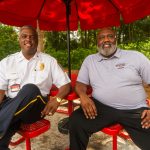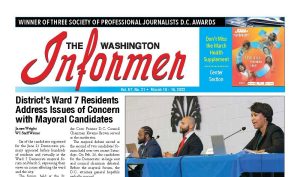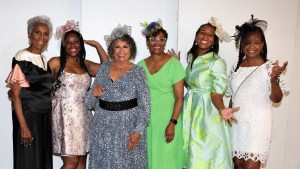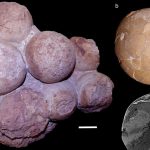Cory D. Moon, Chief for the City of Birmingham Fire & Rescue Service, left, donated a kidney to his older brother Rodney Moon. (Amarr Croskey, For The Birmingham Times)
” data-medium-file=”https://www.birminghamtimes.com/wp-content/uploads/2024/07/MOON1-300×200.jpg” data-large-file=”https://www.birminghamtimes.com/wp-content/uploads/2024/07/MOON1-1024×683.jpg” tabindex=”0″ role=”button” />
By Barnett Wright | The Birmingham Times
As a longtime city of Birmingham firefighter and now chief of the City of Birmingham Fire & Rescue Service (BFRS), Cory D. Moon is used to saving lives. But one life that he’s saved is special to his family — his brother Rodney’s, he said.
The selfless act didn’t come on a call into a city neighborhood, it came at the University of Alabama at Birmingham (UAB) Hospital, where Cory donated a kidney to his older brother 22 years ago.
” data-medium-file=”https://www.birminghamtimes.com/wp-content/uploads/2024/07/20200923_134303-225×300.jpg” data-large-file=”https://www.birminghamtimes.com/wp-content/uploads/2024/07/20200923_134303-768×1024.jpg” tabindex=”0″ role=”button” class=” wp-image-121238″ src=”https://www.birminghamtimes.com/wp-content/uploads/2024/07/20200923_134303.jpg” alt=”” width=”255″ height=”340″ srcset=”https://www.birminghamtimes.com/wp-content/uploads/2024/07/20200923_134303.jpg 1600w, https://www.birminghamtimes.com/wp-content/uploads/2024/07/20200923_134303-225×300.jpg 225w, https://www.birminghamtimes.com/wp-content/uploads/2024/07/20200923_134303-768×1024.jpg 768w, https://www.birminghamtimes.com/wp-content/uploads/2024/07/20200923_134303-1152×1536.jpg 1152w, https://www.birminghamtimes.com/wp-content/uploads/2024/07/20200923_134303-1536×2048.jpg 1536w, https://www.birminghamtimes.com/wp-content/uploads/2024/07/20200923_134303-315×420.jpg 315w, https://www.birminghamtimes.com/wp-content/uploads/2024/07/20200923_134303-640×853.jpg 640w, https://www.birminghamtimes.com/wp-content/uploads/2024/07/20200923_134303-681×908.jpg 681w” sizes=”(max-width: 255px) 100vw, 255px” />
“My brother was diagnosed with kidney disease [while he was attending the University of Alabama], and his situation got worse over the years,” Cory, 45, told The Birmingham Times. “He was getting ready to start dialysis right before we found out we were a match.”
“Dialysis is a type of treatment that … [removes] extra fluid and waste products from [a person’s] blood when the kidneys are not able to,” according to the National Kidney Foundation (NKF).
“[Because we] did the transplant, … [Rodney] never had to go on dialysis,” said Cory.
The Transplant Games of America, being held in The Magic City this week, is the 33rd annual celebration for recipients and living donors—like Rodney and Cory—as well as donor families, individuals on transplant waiting lists, caregivers, and transplant professionals.
“It’s a big deal for the city of Birmingham to even have these games, and it’s even more of a big deal to have this many donors and this many recipients in one place at the same time,” Cory said. “I get to see some of my fellow brothers and sisters that will come to the city of Birmingham.”
“Grown-Man Move”
Rodney, 48, called his younger brother’s decision to donate a kidney a “grown-man move.”
“When you’re a big brother, you always look at your little brother as the little brother,” Rodney told The Times. “I gained a level of respect for him as a grown man. That helped me become closer to him as a man, as a brother, not just a little brother that always followed us around and wanted to be one of the big guys. It’s hard for me to put it into words.”
When it came to donating an organ for his biological brother there was “zero hesitation,” said Cory.
“I had just become a firefighter a year before the kidney transplant, so I wasn’t sure if I’d be able to continue being a firefighter or keep working,” he recalled. “I did not care at all. The only thing that mattered to me was whether my brother would be OK. I didn’t think twice about it.”
It didn’t have to be his brother for him to become a donor, Cory added: “The gift of giving somebody life is priceless. There is no downside to saving a life. … Think about the outcome and how you can save someone’s life by simply donating that organ.”
Rodney and his mother wondered what becoming a donor would mean for Cory. After all, the younger sibling was at the start of his career in the BFRS.
“I remember my mom and I pondering how [Cory] would be impacted?” Rodney said. “Would they sideline him from being able to rappel, [lower your own mass down a rope], carry bodies, and do all the physical things firemen normally do? That’s the part he loved.
“We got the answer back that he would not be impacted. He would have full duty in the fire department. Before we even got the answer, he was fully committed. … He gave me another higher level of respect for him besides from him being the little brother.”
” data-medium-file=”https://www.birminghamtimes.com/wp-content/uploads/2024/07/MOON2-300×200.jpg” data-large-file=”https://www.birminghamtimes.com/wp-content/uploads/2024/07/MOON2-1024×683.jpg” tabindex=”0″ role=”button” class=”size-full wp-image-121234″ src=”https://www.birminghamtimes.com/wp-content/uploads/2024/07/MOON2.jpg” alt=”” width=”1600″ height=”1067″ srcset=”https://www.birminghamtimes.com/wp-content/uploads/2024/07/MOON2.jpg 1600w, https://www.birminghamtimes.com/wp-content/uploads/2024/07/MOON2-300×200.jpg 300w, https://www.birminghamtimes.com/wp-content/uploads/2024/07/MOON2-1024×683.jpg 1024w, https://www.birminghamtimes.com/wp-content/uploads/2024/07/MOON2-768×512.jpg 768w, https://www.birminghamtimes.com/wp-content/uploads/2024/07/MOON2-1536×1024.jpg 1536w, https://www.birminghamtimes.com/wp-content/uploads/2024/07/MOON2-630×420.jpg 630w, https://www.birminghamtimes.com/wp-content/uploads/2024/07/MOON2-640×427.jpg 640w, https://www.birminghamtimes.com/wp-content/uploads/2024/07/MOON2-681×454.jpg 681w” sizes=”(max-width: 1600px) 100vw, 1600px” />
Achieving Goals
The Moon brothers grew up in Birmingham’s West End, in the Central Park community, and came of age in the 1980s.
“There was no cable TV, momma wouldn’t let you outside when it was extremely hot until the sun went down, and you weren’t allowed to go in and out the door to let the air out,” Rodney recalled. “I remember we had a house across the street from us that had an emergency and the fire department pulled up. … We heard the fire sirens and saw the trucks stop in front of the house. … We were looking out the window and [Cory] said to me, ‘I’m going to be a fireman one day.’ He never chose another profession. He never deviated from those words.”
“He fully embraced the idea becoming a fireman at a young age. … I’m just in awe that he was so focused on doing what he said wanted to do that young,” Rodney said.
Cory remembers that day vividly, as well. “That fire happened when I was 10, but I knew I wanted to be firefighter since I was 5,” he said. “The firefighters actually took time to talk to me after they put out the emergency, … and that intrigued me as a young kid. As I got older, that desire just continued to grow. The first job I had was at the Food Fair [supermarket] around the corner from my house in Five Points [area]; it’s now the Birmingham Public Library. It was right across the street from a fire station, so I used to see those guys go in and out when I was 15 and that made [my] desire [to become a firefighter] grow even stronger.”
“I was lucky to have good mentors, [too]. … I stayed focused on who and what I wanted to be, and I was able to achieve my goals,” added Cory, who joined the BFRS in March 2001. He was appointed chief by Mayor Randall Woodfin in October 2019 and sworn in February 2020.
“Something Is Not Right”
” data-medium-file=”https://www.birminghamtimes.com/wp-content/uploads/2024/07/MOON5-200×300.jpg” data-large-file=”https://www.birminghamtimes.com/wp-content/uploads/2024/07/MOON5-683×1024.jpg” tabindex=”0″ role=”button” class=” wp-image-121237″ src=”https://www.birminghamtimes.com/wp-content/uploads/2024/07/MOON5.jpg” alt=”” width=”253″ height=”380″ srcset=”https://www.birminghamtimes.com/wp-content/uploads/2024/07/MOON5.jpg 1600w, https://www.birminghamtimes.com/wp-content/uploads/2024/07/MOON5-200×300.jpg 200w, https://www.birminghamtimes.com/wp-content/uploads/2024/07/MOON5-683×1024.jpg 683w, https://www.birminghamtimes.com/wp-content/uploads/2024/07/MOON5-768×1152.jpg 768w, https://www.birminghamtimes.com/wp-content/uploads/2024/07/MOON5-1024×1536.jpg 1024w, https://www.birminghamtimes.com/wp-content/uploads/2024/07/MOON5-1365×2048.jpg 1365w, https://www.birminghamtimes.com/wp-content/uploads/2024/07/MOON5-280×420.jpg 280w, https://www.birminghamtimes.com/wp-content/uploads/2024/07/MOON5-640×960.jpg 640w, https://www.birminghamtimes.com/wp-content/uploads/2024/07/MOON5-681×1022.jpg 681w” sizes=”(max-width: 253px) 100vw, 253px” />
Rodney remembers being diagnosed with kidney disease in 1995. “I was [attending University of Alabama], and I started experiencing the symptoms of kidney failure,” he said. “I experienced swelling in my legs, and that was an indicator to my mom, who had always been in the medical field. … She looked at my legs and said, ‘You’re retaining fluid. Something is not right.’”
Doctors had Rodney complete a 24-hour urine test, which can help determine how well the kidneys are functioning by measuring how well they clear the blood of protein, hormones, and other chemical compounds, such as creatinine too much can be a sign of a possible kidney problem.
After receiving the results of the 24-hour urine test, Rodney was referred to a nephrologist, a physician who specializes in treating kidney conditions, who diagnosed him with focal sclerosis. The “focal” part, he said, meant “it was localized to my kidneys and was not going to spread.”
“My nephrologist was at Princeton Hospital, and they were able to slow down my kidney failure for about five years,” said Rodney. “I was able to graduate [from Alabama in 1997], pledge [Omega Psi Phi fraternity, Incorporated], Beta Eta Chapter], and do a lot of other things. I was normal.”
That was until 2001 or 2002, “when I started failing bad,” he said.
“Even Closer as a Family”
” data-medium-file=”https://www.birminghamtimes.com/wp-content/uploads/2024/07/MOON4-200×300.jpg” data-large-file=”https://www.birminghamtimes.com/wp-content/uploads/2024/07/MOON4-683×1024.jpg” tabindex=”0″ role=”button” class=” wp-image-121236″ src=”https://www.birminghamtimes.com/wp-content/uploads/2024/07/MOON4.jpg” alt=”” width=”251″ height=”377″ srcset=”https://www.birminghamtimes.com/wp-content/uploads/2024/07/MOON4.jpg 1600w, https://www.birminghamtimes.com/wp-content/uploads/2024/07/MOON4-200×300.jpg 200w, https://www.birminghamtimes.com/wp-content/uploads/2024/07/MOON4-683×1024.jpg 683w, https://www.birminghamtimes.com/wp-content/uploads/2024/07/MOON4-768×1152.jpg 768w, https://www.birminghamtimes.com/wp-content/uploads/2024/07/MOON4-1024×1536.jpg 1024w, https://www.birminghamtimes.com/wp-content/uploads/2024/07/MOON4-1365×2048.jpg 1365w, https://www.birminghamtimes.com/wp-content/uploads/2024/07/MOON4-280×420.jpg 280w, https://www.birminghamtimes.com/wp-content/uploads/2024/07/MOON4-640×960.jpg 640w, https://www.birminghamtimes.com/wp-content/uploads/2024/07/MOON4-681×1022.jpg 681w” sizes=”(max-width: 251px) 100vw, 251px” />
Enter his younger brother. “To start off, I had to stay in the hospital for a day or two just to do the matching part to decide if we were a match,” Cory recalled.
Compatibility is determined by looking at blood type, tissue type, and crossmatching. The Moon brothers were a match, “and we did the surgery [on May 1, 2002],” said Cory.
“We both went [into the hospital] the same day,” he added. “I can’t remember how long the surgery was, but I remember waking up and them wheeling me down to his room because the first thing that I asked was, ‘How’s my brother doing?’ They wheeled my bed down to his room so I could see him.”
Cory said he couldn’t put into words how much it meant to donate an organ to his brother.
“It was just he and I, so we’ve always been close,” Cory said. “The fact that we share this special anniversary has made our bond even more tighter than it already was. It’s hard to put in words how much closer it’s made us because we come from a close-knit family. Obviously, I love my brother, but it absolutely made us even closer as a family.”
Following the surgery, Rodney was “up and walking the next day,” he said. “I call [Cory’s] kidney ‘bionic,’” Rodney added. “He has never really put anything in his body that will hurt him over time: no steroids, no alcohol, no drug abuse. He was in perfect condition, and the fire department worked them and got them in shape. … [My brother] was in the best shape of his life, and I’m the benefactor of that health.”
“My Hero”
Each May 1, the Moon brothers commemorate the day of the transplant. “We usually reach out to each other, send a reminder, and say ‘Congratulations’ and ‘Happy Anniversary,’ so it’s subtle,” Cory said. “We remember and memorialize that day because it’s such a special time for us.
“I wouldn’t be who I am if it had not been for my big brother,” he continued. “My brother is my idol. I wanted to go to college because my brother went to college. I wanted to play sports because my brother played sports. I wanted to get good grades because my brother got good grades. … That’s why the kidney donation was never a thought for me.”
Rodney has embarked on a successful business career as a senior program manager with tech giant Amazon, as a real estate broker and property manager, and as owner with his wife, Karmen, of a recently opened Bruster’s Real Ice Cream franchise in Trussville, Alabama.
“I owe a lot of that energy to Cory because … I [don’t think I would have been able] to do all of this on dialysis,” Rodney said. “I [might not have been] able to do any of the things I’ve been able to do. I’ve been working multiple jobs, … and it takes energy to do that.”
In fact, Rodney said the kidney is working better than the rest of his body. “Every day, I thank God for the kidney working,” he said. “It’s working better than a lot of my original body parts. … I thank God for [Cory] being my hero.”
From July 5–10, Birmingham is hosting the 2024 Transplant Games, where thousands will gather to honor those who have given the gift of life and raise awareness about organ, eye, and tissue donation and transplantation. For more information about the Transplant Games of America, visit transplantgamesofamerica.org.
” data-medium-file=”https://www.birminghamtimes.com/wp-content/uploads/2024/07/MOON3-300×200.jpg” data-large-file=”https://www.birminghamtimes.com/wp-content/uploads/2024/07/MOON3-1024×683.jpg” tabindex=”0″ role=”button” class=”size-full wp-image-121235″ src=”https://www.birminghamtimes.com/wp-content/uploads/2024/07/MOON3.jpg” alt=”” width=”1600″ height=”1067″ srcset=”https://www.birminghamtimes.com/wp-content/uploads/2024/07/MOON3.jpg 1600w, https://www.birminghamtimes.com/wp-content/uploads/2024/07/MOON3-300×200.jpg 300w, https://www.birminghamtimes.com/wp-content/uploads/2024/07/MOON3-1024×683.jpg 1024w, https://www.birminghamtimes.com/wp-content/uploads/2024/07/MOON3-768×512.jpg 768w, https://www.birminghamtimes.com/wp-content/uploads/2024/07/MOON3-1536×1024.jpg 1536w, https://www.birminghamtimes.com/wp-content/uploads/2024/07/MOON3-630×420.jpg 630w, https://www.birminghamtimes.com/wp-content/uploads/2024/07/MOON3-640×427.jpg 640w, https://www.birminghamtimes.com/wp-content/uploads/2024/07/MOON3-681×454.jpg 681w” sizes=”(max-width: 1600px) 100vw, 1600px” />











